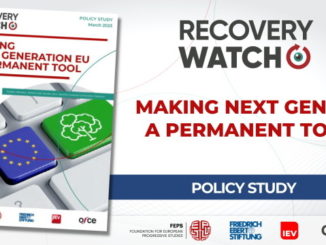
The shortfall in European investment
Sébastien Bock, Aya Elewa, Sarah Guillou, Mauro Napoletano, Lionel Nesta, Evens Salies, Tania Treibich Since Robert Solow’s early work, we have known that long-term economic […]

Sébastien Bock, Aya Elewa, Sarah Guillou, Mauro Napoletano, Lionel Nesta, Evens Salies, Tania Treibich Since Robert Solow’s early work, we have known that long-term economic […]

Frédéric Allemand, Jérôme Creel, Nicolas Leron, Sandrine Levasseur and Francesco Saraceno The Next Generation EU (NGEU) instrument was created during the pandemic to finance the recovery and, above all, to […]

by Elliot Aurissergues, Christophe Blot and Caroline Bozou The latest inflation figures for the United States confirm the trends seen over the last few months. […]

by Christophe Blot, Caroline Bozou and Jérôme Creel The Covid-19 pandemic has led governments and central banks around the world to implement expansionary fiscal and […]

by Xavier Ragot A heated debate is currently taking place in macroeconomics. The change in US economic policy following the election of Joe Biden has […]

Elliot Aurissergues (Economist at the OFCE) As the health constraints caused by the pandemic continue to weigh on the economy in 2021, the challenge is […]

By Christophe Blot, Magali Dauvin and Raul Sampognaro The sharp fall in activity and its brutal social consequences have led governments and central banks to enact ambitious support […]

By Christophe Blot and Paul Hubert The return of new lockdown measures in numerous countries is expected to slow the pace of economic recovery and even lead […]

Jérôme Creel, Xavier Ragot, and Francesco Saraceno The second meeting of the Eurogroup did the trick. The Ministers of Finance, after having once again laid out […]

By Christophe Blot and Xavier Timbeau In parallel with the decisions taken by the US Federal Reserve and the European Central Bank (ECB), governments are […]
Copyright © 2024 | WordPress Theme by MH Themes